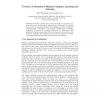378 search results - page 59 / 76 » Comparing environments for developing software agents |
110
click to vote
EMSOFT
2004
Springer
15 years 7 months ago
2004
Springer
Embedded systems are electronic devices that function in the context of a real environment, by sensing and reacting to a set of stimuli. Because of their close interaction with th...
105
click to vote
ATAL
2008
Springer
15 years 4 months ago
2008
Springer
A key challenge for the successful deployment of systems consisting of multiple autonomous networked sensors is the development of decentralised mechanisms to coordinate the activ...
157
click to vote
ITS
1998
Springer
15 years 6 months ago
1998
Springer
We define a learning tutor as being an intelligent agent that learns from human tutors and then tutors human learners. The notion of a learning tutor provides a conceptual framewor...
157
click to vote
CIKM
2009
Springer
15 years 9 months ago
2009
Springer
Trust plays important roles in diverse decentralized environments, including our society at large. Computational trust models help to, for instance, guide users’ judgements in o...
119
click to vote
IAT
2006
IEEE
15 years 8 months ago
2006
IEEE
Combinatorial Auctions (CAs), where users bid on combination of items, have emerged as a useful tool for resource allocation in distributed systems. However, two main difficulties...

